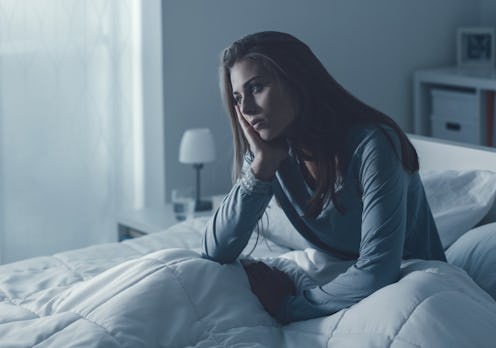Life
7 Hormone Fluctuations That Can Lead To Insomnia

When it comes to getting a solid night's sleep, the usual advice is to have good sleep hygiene. You know, turn off those smartphone screens, give yourself some time to wind down, and try to stick to a regular sleep schedule. But there's stuff going on inside the body can affect how well you sleep, too. In fact, your hormones can play a pretty crucial role in how well you sleep at night.
Hormones are chemicals that tell your organs and your body what to do, says The Conversation, like when to go to sleep, when to wake up, how much to grow, and they even produce that "fight or flight" adrenaline response. Because hormones control your body's processes, they can affect your sleep in so many different ways.
For people with uteruses, you usually hear that hormones affect sleep in relation to the menstrual cycle and menopause. While that's true, there are a lot more ways changes in your hormone levels can keep you from getting a good night's sleep, such as changes to your thyroid or the amount of melatonin your body is producing, according to MindBodyGreen.
"Hormonal changes can wreak havoc on sleep," Gina Shaw wrote for WebMD. "In turn, sleep deprivation can affect hormone levels in a sleepless vicious cycle. So when hormone levels spike or drop ... women may be more vulnerable to sleep problems." Here are just seven hormone fluctuations that could be affecting how well you're sleeping at night.
1Your Estrogen Levels Are Too High Or Low
Higher levels of estrogen can make you feel more tired, which is why pregnancy typically makes people with uteruses way more tired than usual, according to Yale Medicine. That means if your estrogen levels are too low, says Yale Medicine, you could have trouble sleeping or even experience insomnia.
2Your Progesterone Levels Are Too Low
Like estrogen, lower progesterone levels can also affect your quality of sleep, according to Yale Medicine. You might find you have a little trouble sleeping right before your period because that's when your body's progesterone levels are typically at their lowest.
3Your Cortisol Levels Are Too High
Cortisol is the "fight or flight" stress hormone, and if your cortisol levels get too high, it can inhibit your ovaries, according to MindBodyGreen. When your ovaries aren't functioning properly, says MindBodyGreen, that can cause your estrogen levels to drop, which can affect your quality of sleep.
4Your Melatonin Levels Are Too Low
You've probably seen melatonin sold as a sleep aid, but it's also a naturally occurring hormone that regulates your sleep cycle, according to the The Conversation. Being around bright lights before bed or working the night shift can affect the body's release of melatonin, says The Conversation, so your body won't get the signal when it's time to go to sleep.
5Your Testosterone Levels Are Too Low
Everyone has a certain amount of testosterone, and if people with uteruses have low testosterone levels, they can have trouble sleeping, according to Medical News Today. Unfortunately, there's no solid research that says exactly what amount of testosterone counts as "low" for people with uteruses, says Medical News Today, but every person should have some testosterone in their system to stay healthy.
6Your Growth Hormone Levels Are Too Low
Although the growth hormone does regulate growth during childhood, it also regulates all kinds of other daily bodily functions, including sleep, according to the book Physiology, Growth Hormone. Your pituitary gland secretes growth hormone at night, says Women's International Pharmacy, so if your growth hormone levels are off, you're not going to sleep very well.
7Your Thyroid Levels Are Off
There are a couple of different ways your thyroid can affect your sleep. According to the National Sleep Foundation, when your thyroid produces too much thyroid hormone (hyperthyroidism), that's going to make you anxious and make it hard for you to sleep. But when your thyroid doesn't produce enough hormone, says the National Sleep Foundation, you're going to feel like you just can't get enough sleep.
8
If you think you might have a hormonal imbalance, Medical News Today says practicing self-care by eating a nutritious diet, getting regular activity, and managing your stress could help your symptoms. But if your sleep still doesn't improve, you might want to talk to your doctor. Fluctuations in your hormones might be messing with your sleep right now, but it doesn't have to stay like that forever.